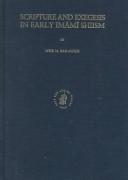| Listing 1 - 2 of 2 |
Sort by
|

ISBN: 9004114955 9789004114951 9789004452886 9004452885 Year: 1999 Volume: 37 Publisher: Leiden : Jerusalem : E.J. Brill The Magnes Press, the Hebrew University,
Abstract | Keywords | Export | Availability | Bookmark
 Loading...
Loading...Choose an application
- Reference Manager
- EndNote
- RefWorks (Direct export to RefWorks)
Since the publication in 1921 of Ignaz Goldziher's Die Richtungen der islamischen Koransauslegung , which includes a discussion of Imāmī exegesis, no comprehensive work on this topic has appeared. In the intervening years, important Imāmī commentaries on the Qur'ān have become available, making possible a reappraisal of the subject. The present study aims to contribute to this task, primarily by examining the features and methods of Imāmī exegesis. Principally, it offers a description and analysis of the major tenets of Imāmī doctrine, as reflected in the earliest Imāmī works of exegesis and related sources, up to the Major Occultation of the twelfth Imam in 329/941. These include, among others, the belief in a primordial covenant between God and the Shī'a, and the superhuman and mystical qualities with which the Imams were graced, such as their God-given, infinite knowledge, their intercession on behalf of their community, their immunity from sin and error, etc. Other tenets relate to the attitude of Imāmī Shī'ism to its enemies, e.g. the duty to denigrate and dissociate from them. These and similar ideas are constant motifs in Imāmī exegesis, and are linked time and again with various Qur'ānic verses. Relying on classical and modern Arabic sources, Sunnī and Shī'ī alike, as well as on a wide range of western research, Meir Bar-Asher sheds new light on the Imāmī methods of exegesis and on the principal Imāmī doctrines as reflected in the early Imāmī exegetical corpus.
Qur'an --- Commentaries --- History and criticism --- Criticism, interpretation, etc --- Imams (Shiites) - History. --- Shåi°ah - History. --- Imams (Shiites) --- Shiism --- History --- Imams --- Shīʻah --- Shiites --- Imamites --- Shia --- Twelvers (Islam) --- Islamic sects --- Alids --- Coran --- Imāms (chiites) --- Chiisme --- Critique, interprétation, etc. --- 10e siècle --- 11e siècle --- Histoire
Book
ISBN: 9782503531144 2503531148 Year: 2009 Volume: 137 Publisher: Turnhout: Brepols,
Abstract | Keywords | Export | Availability | Bookmark
 Loading...
Loading...Choose an application
- Reference Manager
- EndNote
- RefWorks (Direct export to RefWorks)
Au printemps 1968, lorsque la France et bon nombre d’endroits dans le monde étaient secoués par des mouvements de protestations sociopolitiques importants, quelques grands savants se réunissaient à la vieille et prestigieuse université de Strasbourg et allaient déclencher un véritable tournant dans les études islamologiques en Occident. En effet, pour la première fois, des chercheurs d’envergure mondiale se rencontraient dans un colloque exclusivement consacré au shi'isme imamite. Les conférences et les discussions aboutirent à la publication d’un excellent recueil d’articles: Le shî'isme imâmite: Colloque de Strasbourg (6-9 mai 1968), Presses Universitaires de France, Paris 1970.Si nous avons souhaité associer le 40e anniversaire de cet événement à l’hommage que nous voulions rendre à Etan Kohlberg, c’est pour souligner le rôle majeur de ce dernier dans l’enrichissement et l’approfondissement des études consacrées au shiisme imamite. En effet, l’ampleur de ses connaissances, la rigueur radicale de son érudition et ses grandes qualités humaines ont été des facteurs décisifs dans la diffusion des études shi'ites et leur transmission à travers la formation de générations entières de chercheurs.Ainsi, ce volume d’hommage se veut un témoignage de l’essor grandissant des études shi'ites imamites et de la dette indéniable de celles-ci aux savants réunis, il y a quarante ans, à Strasbourg, ainsi qu’à l’œuvre immense d’Etan Kohlberg.
Shiites. --- Shi'ah --- Chiites --- Chiisme --- Kohlberg, Etan. --- Shiites --- 297 <082> --- Islam. Mohammedanisme--Feestbundels. Festschriften --- Festschrift - Libri Amicorum --- Shīʻah --- Shia Muslims --- Shiah Muslims --- Shiahs --- Shias --- Shiite Muslims --- Muslims
| Listing 1 - 2 of 2 |
Sort by
|

 Search
Search Feedback
Feedback About UniCat
About UniCat  Help
Help News
News